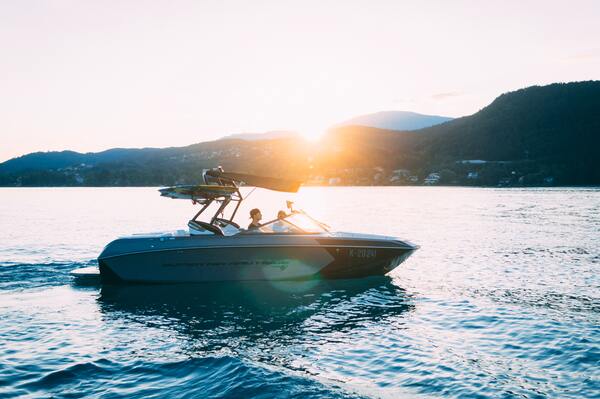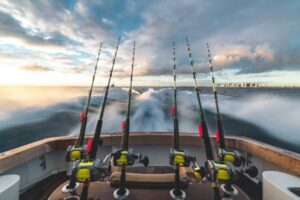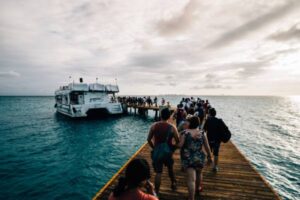Boating accidents and fatalities are largely attributed to alcohol. Alcohol affects watercraft operators and passengers in a number of negative ways. Alcohol causes accidents and poor decisions because it impairs judgment and coordination. Read the article and learn how alcohol affects boat operators and passengers.
What Is Alcohol
Alcohol, a psychoactive substance, is produced by the reaction of water, carbon dioxide, and ethanol. Because it is the most commonly used narcotic on the planet, it is also known as “liquid courage.”
Despite being a popular beverage, alcohol has a number of medical applications.
Alcohol is a depressant that is present in a wide variety of beverages. Typically, it is expressed as a percentage of volume or as grams per 100 milliliters (ml). Alcohol can be found in vodka, gin, rum, whiskey, and brandy.
You become drowsy, unsteady, and confused as a result of alcohol’s central nervous system-slowing effects. Additionally, it lowers your guard, leading you to engage in risky activities.
Alcohol consumption causes people to feel confident and euphoric momentarily. It can help people unwind and reduce stress. Some people drink to get drunk and then partake in risky behavior.
Addicts to alcohol frequently experience difficulties in their daily lives. They frequently lack control over their urge to drink or how much they consume.
How Does Alcohol Affect Operators
For those who operate watercraft, drinking alcohol can have a number of detrimental effects. The results vary based on the amount of alcohol consumed, how long it has been in the system, and the kind of boat they are operating.
Alcohol users tend to act more hastily, which frequently results in accidents. Boat operators become less aware of their surroundings, which could put them in danger.
One of the leading causes of death in the maritime sector is alcohol-related accidents, which are estimated to cost employers $2.6 billion annually.
Alcohol abusers are more likely to fall asleep at the wheel, cause collisions, and become incapacitated while on the job.
By limiting drinking in the water, vessel captains can prevent harm to themselves and their crew members.

How Does Alcohol Affect Passengers
It is true that drinking alcohol and boating never mix. Alcohol affects judgment, balance, and coordination, all of which are necessary for safely navigating a vessel. It is also prohibited to operate a boat while under the influence of alcohol.
Alcohol consumption can have a significant negative impact on recreational boaters, as it can exacerbate the effects of dehydration and sun exposure. Additionally, drunk passengers are more likely to make risky decisions or fall overboard.
- You are compelled to carry out actions you would rather avoid.
Because alcohol is a depressant, it slows down the brain’s processing speed and makes it challenging to make decisions and take care of oneself. Combining alcohol with sailing (or other activities) can put you in dangerous situations because you lose your inhibitions and do things you would normally avoid.
- Drinking too much has the potential to be fatal.
Passengers who have consumed alcohol frequently make mistakes. They not only run the risk of hurting themselves while maneuvering the boat, but they can also divert the attention of the pilot and result in accidents that disturb the peace.
So, before getting out on the chilly water, it’s crucial to understand the risks associated with alcohol. If you ever intend to consume alcohol, choose a sober driver and make sure to always wear clothing and a life jacket.
Risks Associated With Drinking And Boating
It is common knowledge that driving while intoxicated is risky. But many people are aware that boating and drinking can both be dangerous.
Alcohol is a significant factor in numerous boating mishaps and fatalities each year.
Several dangers of drinking and boating are listed below:
- Impaired Judgment
Drinking alcohol can make it difficult to navigate a boat safely because it impairs judgment, causes problems focusing, and affects balance and coordination.
- Reduced Reaction Time
Your ability to react quickly will be slower if you are drinking. For both boat operators and passengers, this may make it challenging to act swiftly in an emergency situation.
- Lowered Body Temperature
You run a higher risk of developing hypothermia if you fall into the water after drinking alcohol because it lowers body temperature.
- Drowning
Even for skilled swimmers, consuming alcohol significantly raises the risk of drowning.
These are just a few of the risks connected to drinking and boating. So be sure to keep your alcohol consumption to a minimum if you intend to spend the day on the water.
The Importance Of Not Drinking And Sailing
Drinking and boating can be a dangerous combination, and reckless behavior can have disastrous consequences. Recreational activities that put people and property in danger include drinking and boating.
Avoiding alcohol is one of the most important things you can do to ensure your safety if you choose to go sailing. Alcohol impairs your judgment, makes it difficult to safely operate a boat and can lead to dangerous interactions with other boats or the ocean.
If you are found guilty of drunken boating, you risk jail time and fines. Therefore, avoid taking any chances and use caution when drinking at sea.
What To Do If You Must Boat After Drinking
If you intend to consume alcohol while boating, you must take safety precautions. Consider the following advice:
- No matter whether you intend to drink while boating, you should always wear a life jacket.
- Never allow someone under the influence of alcohol to operate a boat.
- Avoid consuming alcohol while on the water, especially if you are the captain or operator of the ship.
- Drink in moderation and be aware of how alcohol affects your capacity for safe boat operation.
- Don’t allow intoxicated passengers to operate the boat.
- Make sure everyone on board is aware of the dangers of drinking and boating.
- Stay hydrated by avoiding too much sun exposure and drinking lots of water.
- Before getting on the water, avoid congested waterways and consider the weather.
- Particularly if you have had alcohol, exercise caution when getting on or off a boat.
- Identify a designated driver who won’t be operating the boat if you do decide to consume alcohol.
You can help ensure a safe and enjoyable experience on the water by following these easy tips.



